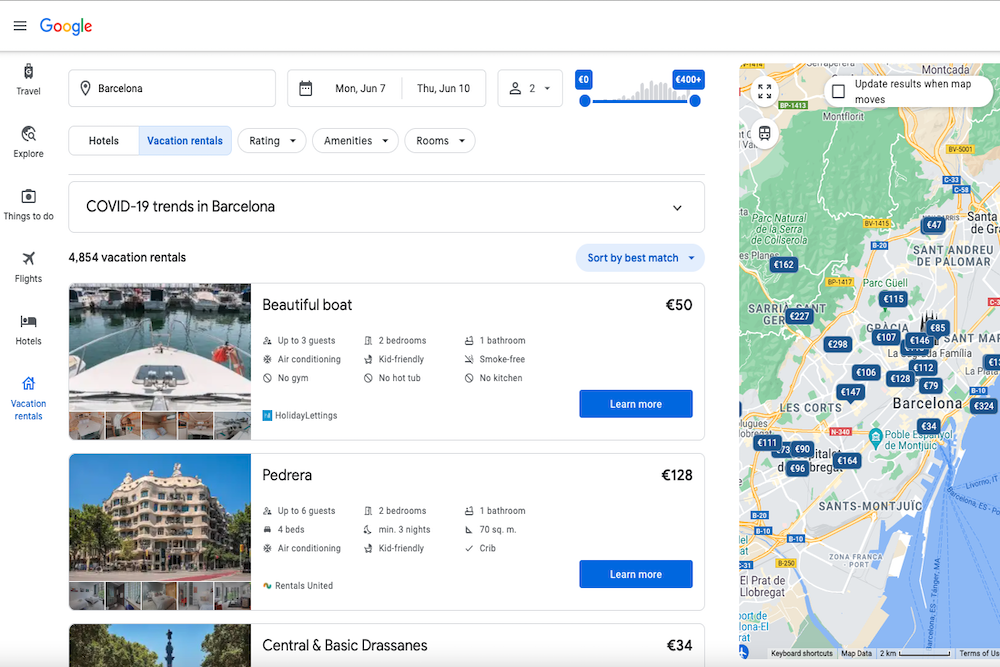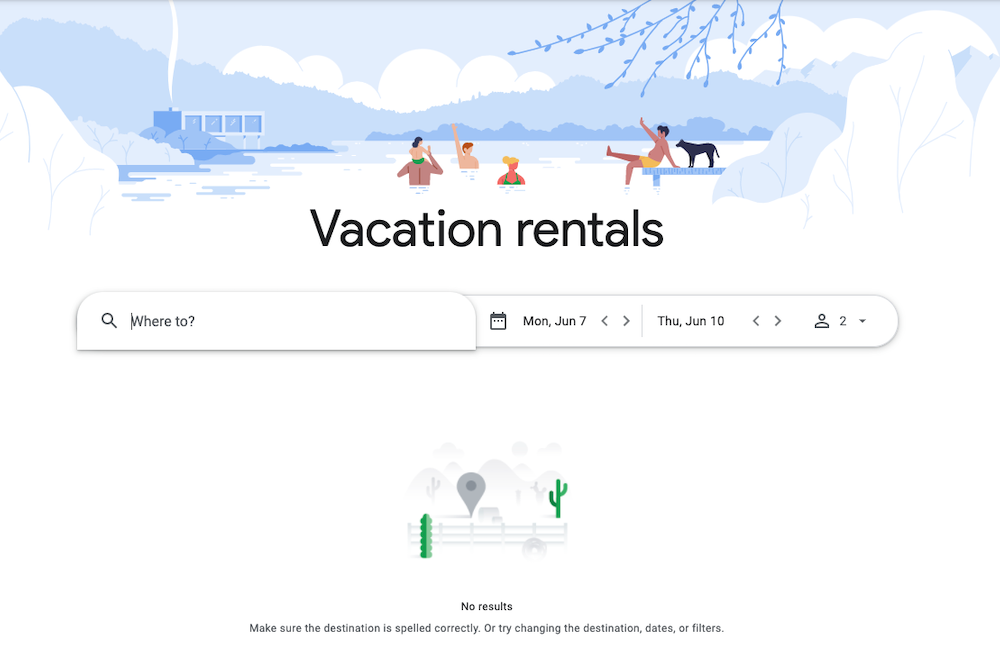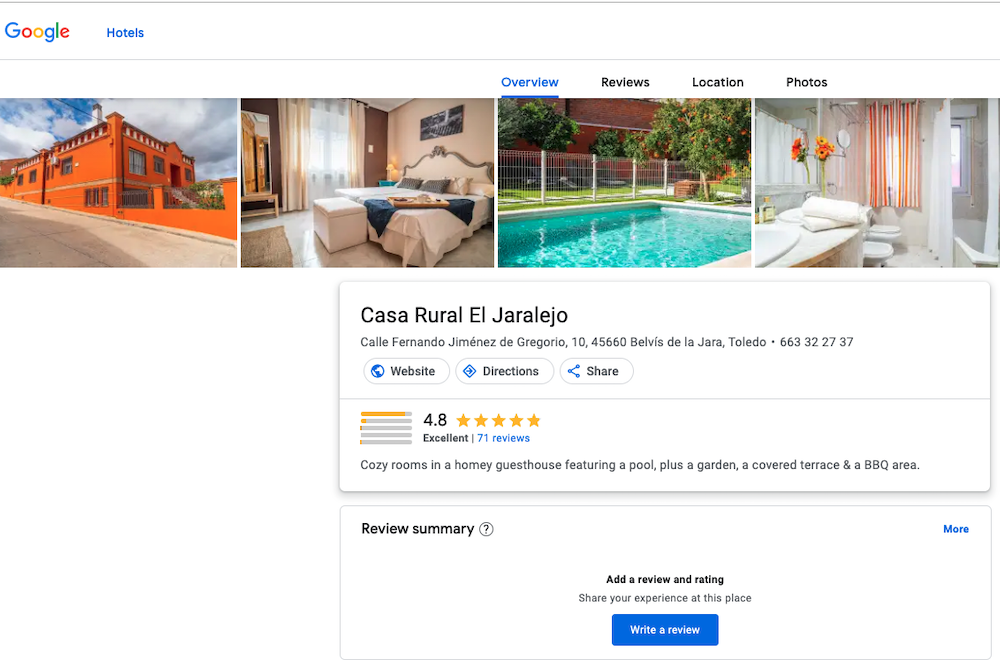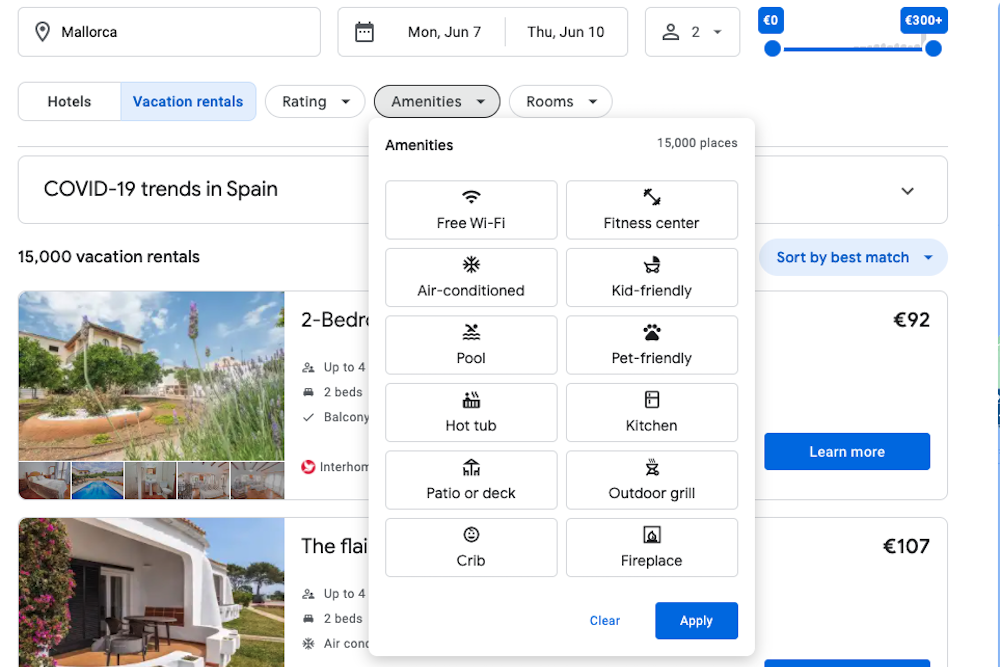As the needs of travelers changed this past year, the industry listened. With the rise of travel trends like staycationing and remote working holidays, the hospitality industry had to evolve. In the midst of a pandemic, travel saw the change of a lifetime. That’s where Google Travel has made its grand debut.
Of course, owners and property managers would now like to know how they can join in on the excitement and make their own property appear in the vacation rental search results as a listing under the new Google Travel feature. Want to learn all about how to list your vacation rental on Google? Keep reading.
What is the Google Vacation Rentals listings feature?
Searching for travel on Google isn’t something new, but it has changed quite a bit. In the wake of Covid, restrictions and PCR requirements were quickly highlighted in search features.
Now the searching engine giant is ready to change once more.
To find flights, users can simply type in their point of departure and final destinations, along with the word “flights” into the main search bar. Google will then present them with all flight options, the airline providers, and a handy drop-down calendar to edit the dates.

Additionally, the Google Hotel Ads search feature has been around for years. Travelers can search for a city plus the word “hotel” (or alternatively, directly in Google Maps) and all the available options will appear, now including Vacation Rentals as well.
No matter whether you’re using a mobile or desktop device, it’s a quick and painless process to find the best value travel combinations with Google – whether you’re seeking a flight and a hotel or a rental car and a beach villa.
Google has expanded and added the Google Vacation Rentals search function to its hotel search results and is ready to fully integrate short-term properties into the mix.
Is Google Travel the future of vacation rental listings?
The bid for popularity in the world of OTAs, like Airbnb and Vrbo, just got that much more competitive. The market is crowded with players trying to win the attention of guests. Google’s notoriety adds pressure to the existing key players in the travel industry.
To be clear, Google was no stranger to the industry before, but its presence is now making waves in a new way. Fortunately for vacation rental owners, this change comes as a big asset.

First and foremost, as Google embraces the vacation rental market, it’s highly likely to affect advertising costs for the big listing sites.
Currently, OTAs monopolize the first paid and organic search results for major vacation destinations and keywords.
However, with Google Travel now blending both hotels and vacation rentals, it will be interesting to see if they can maintain these positions – or if their ad spend will have to increase tenfold to keep up with the competition of smaller, individual owners.
Unlike big brands like Airbnb and Vrbo, Google Travel features hotels too, setting it apart from its competition. Vacation rentals have a much better chance of getting noticed in the accommodation world.
So is this benefit just a trend or is it here to stay? With the movement towards more personalized travel and authentic accommodations, we’re confident that Google wouldn’t enter the industry if they weren’t planning to lead it.
Google Travel vs OTAs
OTAs and hotel chains might be nervous, but vacation rental owners should be rejoicing. The playing field will be a lot more even now that short-term property owners can compete in the same sphere as hotels.
Property listings will be displayed just like hotel offerings are now. All things equal, vacation rentals stand a much better chance of capturing the attention of a wider audience.
Some OTAs, like Vrbo and Airbnb, focus on vacation rental homes, whether that’s an entire stay or an individual room. Other OTAs like Booking.com and Expedia feature a combination of hotels and short-term stays with an emphasis on hotels.
Despite the many options that other OTAs offer, Google plans to offer a balanced combination of the two accommodation types. Instead of vacation rentals being an “others” tickbox, they’re now treated like any other holiday stay in Google’s search engine.
Benefits of listing your vacation rentals on Google
As we’ve mentioned, Google has successfully integrated vacation rental properties into the Hotel Search functionality, with rental inventories showing up in Google Maps and search results along with hotels.

Vacation rental owners and property managers can benefit from connecting their properties to Google if they’re looking to grow their business, diversify revenue streams and expand brand visibility, just to name a few. This new feature brings nothing but positives and we’re excited to share more about it.
Increase online visibility
Any mention of your vacation rental brand is one more opportunity for potential guests to click through to your page. The more traffic, clicks and mentions you have the more bookings you’re bound to get too. Google makes up for almost 90% of the search market share in the United States, so when you list your vacation rental on Google Travel you increase your chances of gaining visibility from their popularity.
There are a number of ways to increase visibility, such as uploading high-quality photos or building partnerships with local businesses, but claiming your fame on Google is a big one. Make your vacation rental business worth looking at by creating an aesthetically pleasing website after guests find you on Google Travel.
Build client trust
Nowadays reviews and access to information is everything when it comes to bookability. Customers want to feel confident in their choice to book your rental. Google is well known and has a polished reputation making it a top choice for customers. When guests see your listing on Google Travel they associate your property with the same standards that Google offers.

Customers know what they’re going to get with Google. Let the predictability and reliability translate to your business by linking your short-term rental website to Google Travel.
Only attract highly qualified guests
Because the Google Travel website is so customized, you’ll only get qualified traffic coming to your website. You want to reach as many people as possible, while also making sure the people finding your page are the right kind of visitors: potential guests!
The Google vacation home rentals option provides the usual filters: travel dates, location and number of guests. The huge difference is that the viewers that have made it to that page have already narrowed their search from “travel” and “type of accommodation” to “vacation rentals.” The people coming to your page through Google Travel are already a perfect match for your short-term rental.
Direct bookings
The ideal situation for any vacation rental owner is convenient, commission-free bookings. When guests book through large OTAs, your business faces fees and commissions. Unlike its competitors, Google currently doesn’t charge for listing your vacation rental website on their site nor do they collect any commission from bookings redirected to your website.

When you list your vacation rental on Google, you’re gearing up for all profits and no fees. You can put that money saved towards a marketing campaign or a website upgrade.
Go international
The world has gotten a whole lot smaller with the reach of Google. Many local search engines or community-based websites are a great place to start, but they’re unlikely to take your business to an international level.
Google processes over 40,000 search queries every second. That’s quite a bit of traffic! If you want to expand your targets to international travelers, you’ll have to go big. Google Travel brings you to the global scale without having to do anything more than linking your listing to your vacation rental website.
Compete with hotels
Hotels are no longer the only ones dominating the accommodations market. The changes in Google Travel make it so vacation rentals can fairly compete with hotels. The travel industry has evolved to where people are looking for more unique stays, such as a quaint cabin in the woods or a trendy bed and breakfast. To cater to this shift, Google has shifted the way they display accommodations.
Google has created a combined hotel/rental search product. Both types of accommodation are displayed in the same manner now meaning that traffic that would have been filtered for more traditional accommodations now has the chance to view what your rental has to offer as well.
Expand your inventory
If you own multiple properties, the changes to Google Travel will come as great news. One of Google’s main objectives for their travel page is to ensure variety to users. This intended variety not only increases your overall viewership but also you can promote each individual property rather than listing it as one company. Each of your properties will have the chance to compete against hotels and other accommodations.

How does Google display vacation rentals?
Your vacation rental website
The best part about Google Travel is the ability to link to your vacation rental website. With this option, you can bypass the third parties and direct clients directly to your page, goodbye fees and commissions!
Travelers can click on the Map or “More places” to see the full list, then view on Google Maps and adjust the rating of the rentals they want to see. There is also a direct website link, so if they click on one of the listings, the contact information will show up, as well as the opening hours, images, Google street view and reviews.
You can’t list on Google simply by having a vacation rental website, though. There are certain steps you need to take first to prepare your website and make it appear as a listing on Google. Don’t worry, we tell you exactly how in our next section!
Bonus: Watch our webinar on how people will find your website on Google. Learn more about Google My Business and other Google free business tools.
Your OTA listings
Most Google vacation rental listings weren’t previously displayed on the main results page, but will now appear on the same page as “hotel” search results.
Doing so brings up a list of private accommodation options, although it is still not quite as extensive as other OTAs which have more offerings.
However, keep in mind that these results only display listings from OTAs which are Google partners. Amongst those partner listing sites are Vrbo, Expedia, Tripadvisor and Hotels.com, among others. As of now, Airbnb and Booking.com listings are not yet included.
Just as it does with flights and hotels, Google displays search results for vacation rentals as a comparison shop with a map view on the side which shows the general location and the price. Travelers can readjust the stay period and the location, the number of guests and the nightly rate they want to look for.

Note that the exact location of your rental is not directly written on Google – it will only be revealed after a booking is confirmed.
Additionally, travelers can also filter the results according to their personal requirements or preferences. That way, only rentals with a certain guest rating, number of bedrooms and bathrooms or types of amenities will show.
So, for example, guests can specifically search for a rental that is kid-friendly, offers free WiFi and a pool. Be sure to tick those boxes on your listing, so Google knows that your property offers those amenities and includes them in the results.
How to get your website ready for Google vacation rentals
In order for a vacation rental to appear in Google searches, you will need to create a business profile for it on Google My Business. There are also some other requirements which will help your vacation rental website show up in SERPs.
Here is what to take into account:
1. Have one URL for each rental property
All of your properties may be listed on the same website, but they will each need their own URL.
This makes it easier for Google to identify them as different vacation rentals and will help them to appear as such in search results. If you don’t, you run the risk of not having each property promoted in Google Travel.
2. Ensure you have clean URLs
A clean URL is a web address that is easy for humans to read, understand and type.
Dirty URLs, on the other hand, contain question marks and other query parameters. As a general rule, search engines actively ignore these types of URLs or rank these pages lower. Not only is this very bad for your website’s SEO, but it will also spoil any chances of your property showing up in vacation rental search results.
3. Create an optimized and verified Google My Business listing
In order for the search engine to capture a property, owners will have to be on Google My Business. But first, you need to pick the category that better suits your property. At the moment, options are quite limited, but they’re expected to grow in the future.
The two most relevant categories available for vacation rentals are: Holiday Apartment Rental and Cottage Rental. However, if none of them fit your business description, there are some alternatives to choose from, such as: Short-Term Apartment Rental Agency, Vacation Home Rental Agency, Cabin Rental Agency, Apartment Rental Agency and Condominium Rental Agency.
4. Have an SSL certified website
Since early 2017, Google began to penalize websites that weren’t secure (in other words, those which lacked HTTPS and SSL encryption). Ensuring your website has these security certificates now will make showing up on Google search results much easier. Having HTTPS on your website also protects guests’ data from hackers or cyber-attacks. This makes the booking process a lot smoother and safer for everybody.
Takeaways
Owners already know that the guest will find the best price when they book directly on their website, as they will be saving the service fees set by OTAs which can range from 6-18% in some cases. However, Google will spare owners and managers the job of educating guests about the many advantages of booking direct, as it will be clear where the best deal is. Get ready for some big changes coming your way!


